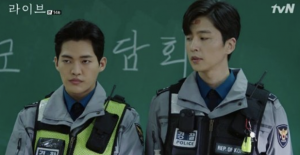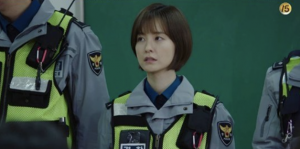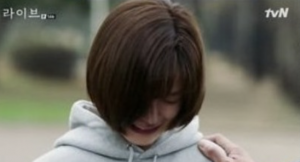Synopsis:
Before the retirement, Sam Bo is worrying about his fellow junior police officer, Haeri, who is showing jealousy toward other junior police officers. Not worrying about Haeri, Han Jung-O is provoking the hatred of the parents of the high school students since she has talked about different perspectives about the sexual education that the parents thought of. Sang Su keep tells Jung-O to apologize to the high school parents, but Jung-O has no doubt that she was right about giving the sexual education. Sang Su did not understand the reason why she was being so stubborn; however, after hearing the reason why she could not give up not to apologize, he is remorseful.
Discussion:
While knowing the fact that the sex education in Korean society is not common, adults tend to conceal the reality of the sexual activities to their teenagers. In Episode 14, it addresses an urgent problem that could be resolved momentarily but still is an ongoing problem. I personally believe that giving proper sex education to teenagers is an important factor to the teenagers’ lives who are growing up as the grownups. Talking about the ways of the protections of sexual intercourses, preventions of sexual assaults, types of birth control pills, and so on should not be considered as ‘embarrassing’ topics to discuss about but ought to be ‘naturally’ reviewed among the parents and children.
In Episode 14, we can easily see the perspective of Korean parents about the sex education. For example, Jung-O made the high school students’ parents infuriated because she mentioned the proper ways to educate teenagers about sex. They first asked the police officers about the ways to avoid the sexual assault or attack. And then, they answered their own question by giving an example of installing more surveillance cameras around the school. If so, would there be zero percent of the sexual assault? Of course not! Because of parents’ and teachers’ hesitation, it may lead the teenagers to get even more improper ideas about sex from all kinds of different sources such as pornographic videos, magazines and internet (Sohn and Han 2002, 46).
Personally, I attended international school in Korea and my school provided a proper sex education since I was in an US curriculum-based school with American teachers. However, there were one incident where one girl got pregnant and she dropped out of school to get the abortion. EVEN receiving a proper sex education could still lead the students to make mistakes; yet, I believe that giving out a proper sex education can lead the students to make less mistakes such as using protections. At least, students who have received the sex education tend to have less sexual activities than those who did not (Sohn and Han 2002, 55). It is impossible to drop the percentage of making mistakes to zero, but with adults’ help, adolescents can make the right decisions.
In conclusion, receiving a proper sex education is a very important factor in adolescents’ lives in order to grow up as mature adults. In order to give them the appropriate sex education, adults should be additionally educated and receive adequate training and guidelines to become more comfortable delivering such important information that could actually change students’ lives (Soh and Han 2002, 58).
Largely, we could think about these questions:
- Do you think there are specific reasons why most of Korean parents do think that sex education is not as important as their child/children getting into college? Or is it all like this in Asia? What are the differences between Asian and Western cultures about this education?
- If you were a Korean parent who has a child who is a senior in high school, do you think that you are able to sit him or her down and educate them about sex? (Imagine to be in a position where people hide information about sex education).
Word Count: 530
Bibliography:
- Aeree Sohn, and Hee Jeong Han. “Adolescents’ Sexuality and School-Based Sex Education in South Korea.” Journal of Korean Society for Health Education and Promotion19 (December 2002): 45-60. Accessed October 31, 2018.


